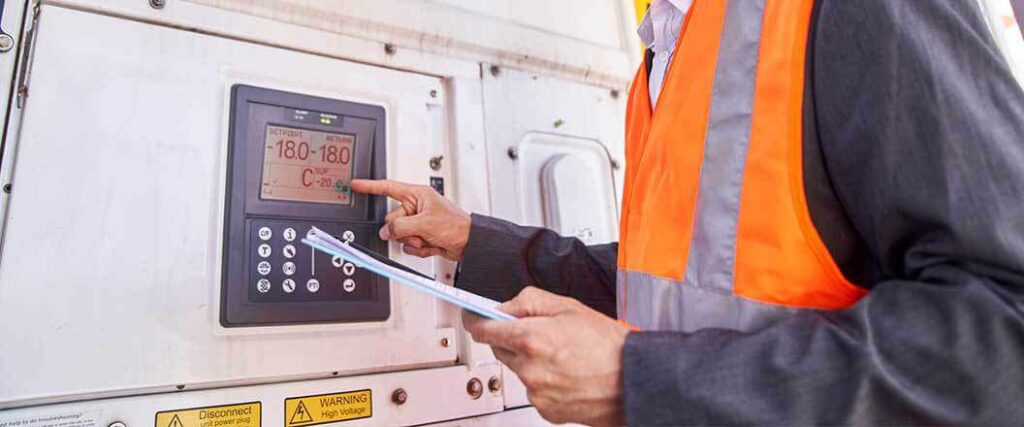Temperature controlled cargo refers to the storage and transfer of temperature sensitive cargo. Maintaining specific temperature ranges during packing and shipping is important to ensure successful shipping of refrigerated cargo. In a tight economy, you want as many successful deliveries as possible.
The Food and Drug Administration (FDA) Food Safety Modernization Act (FSMA) of 2013 regulates shipping practices for temperature controlled cargo. Their mandate is set in place to ensure that all commodities being stored or shipped are safe for consumption and that all vehicles are cleaned and sterilized between every load.
Cooling cargo for extended periods of time takes skill and the use of the right equipment. This guide will illustrate what temperature controlled cargo is and how it is transported all over the country.

Transporting thermal sensitive goods is not an easy task. Fortunately, partnering with an experienced provider is the smartest way to move your climate controlled commodities. This ensures that the integrity of your cargo is maintained through specialized handling.
Temperature controlled cargo is transported through the use of refrigerated vehicles and storage devices. While climate controlled cargo is shipped all over the country every single day, transporting this kind of cargo takes definitive data, market research, resources, and expertise.
Annually, refrigerated third party logistics (3PL) capacity is stretched to its limits. Because of this demand, the refrigerated fleet and storage capacity are constantly growing. Plus, advancements in technology are making cooling more reliable and accurate.
The reefer supply chain, which is more commonly known as a cold chain in logistics, has worked out how to move things like frozen foods, pharmaceuticals, and much more while maintaining all safety and health standards.
Some of the latest advancements in temperature controlled logistics transportation include:
There are various transport options used in order to meet the demand for refrigerated logistics. These options serve both the domestic and international markets in ocean and overland shipping.
The Food and Drug Administration (FDA), in its continuing effort to keep products meant for consumption safe, put out the Food Safety Modernization Act in 2013. In order to maintain the temperature range, goods are required to have all temperature conditions met in order to hold a specified degree range.
Through the use of refrigerated or pharmaceutical logistics, otherwise known as reefer logistics, vehicles are used in the transportation efforts of climate controlled cargo. These vehicles cover the gamut of global and domestic shipping.
| Capacity Year | Market Value |
| 2023 | $31 Billion |
| 2024 | $40 Billion |
| 2025 | $52 Billion |
| 2026 | $66 Billion |
| 2027 | $85 Billion |
| 2028 | $109 Billion |
| 2029 | $140 Billion |
| 2030 | $180 Billion |
To keep up with rising demand as well as safety requirements, manufacturers are continuing to invest in newer and safer options.
Types of vehicles used in temperature controlled transport logistics for domestic and international refrigerated cold chains include:
Domestically, the common methods of transport are truckload, rail, and aircraft, but internationally the refrigerated freight community utilizes all methods for transporting these temperature sensitive commodities.
The most common refrigerated vehicle type is the domestic truckload trailer that uses insulating materials and is equipped with a refrigerated power unit and thermostat. These units are tasked with regulating and maintaining reliable and consistent ambient temperatures.
Temperature controlled storage options for cargo require a set or ranged temperature standard. These storage solutions are designed to keep their contents frozen or refrigerated. This is achieved electrically or through the use of dry ice in every individual container.
Container solutions for temperature maintenance include:
Examples of different reefer containers for shipping are:
These cooling solutions serve to hold those specific temperature ranges we mentioned. Through the use of refrigerated vehicles, not only can temperature ranges be maintained, but the cargo can move between two points with success.
The more loads you move successfully, the less money you lose out on because of spoilage, lost revenue, or even freight insurance claims

So many industries around the world deal with goods that are sensitive to the elements. They trust and use cold chain logistics regularly to move their freight all over the world. These industries range from food to pharmaceutical.
Floral Products
Technological Products
Food Products
Pharmaceutical Products
These are just some examples of the many types of potential cargo that can fill a reefer container or trailer. There are other types of cargo out there that may require refrigerated cold transportation.
Always check with the various federal agencies for who you may need to contact.
The FDA has spearheaded the Sanitary Food Transportation Act (SFTA) of 2005 which regulates the transportation practices of cold chains and all climate controlled transportation services. This would lend itself to the FMSA in 2013.
Refrigerated warehousing and handling requires OSHA guidelines to prevent any damage or danger to human life. This is especially critical when considering the movement of such products as chemicals, pharmaceuticals, or any flammable or toxic substance.
The EPA can affect temperature controlled logistics in a number of ways. For example, If the HVAC unit uses propane, isobutane, or ethane, then you are in violation of section 612 of the Clean Air Act of (CAA) 1970.

There are many reasons why temperature controlled shipping is right for you and your business. While more difficult to procure than regular truckload shipping, temperature regulated transportation is the most reliable method available when you have goods you can’t risk.
Items that are sensitive to temperatures and other elements require accuracy, safe handling, and the right conditions. The value of your cargo can plummet in an instant if the proper equipment, information, and skill is not utilized.
That is why it is essential to take the greatest care when researching what the appropriate temperature ranges are for your cargo. Once that is done, and the cargo is loaded safely in a climate appropriate environment, the benefits become realized.
Benefits of temperature controlled shipping for the cargo include:
Benefits of temperature controlled shipping for the business
These benefits are a standard byproduct of being able to ship your freight with confidence. Ultimately, the primary concern as a business is the preservation of your goods from acquisition to sale.
Building a reputation for quality and reliability is central for any business. A refrigerated 3PL can help create and foster a reputation for your endeavors like no other.

When freight is shipped all over the world, some of it is refrigerated. Does this mean that temperature controlled goods are always cold? No, temperature controlled cargo is not always cold, sometimes it can be heated or lightly cooled.
Whether hot or cold, climate controlled cargo can fall victim to a number of failures in their container or general shipping equipment.
Maintaining a consistent climate is critical for the movement of refrigerated cargo. It is vital that all equipment used undergoes regularly scheduled maintenance and fuel levels are monitored accordingly.
Keeping your goods cold relies on more than just equipment, it also requires a deep knowledge of how to deploy cold storage solutions and what type of technologies, like global positioning systems (GPS), to use in maintaining cold cargo temperatures.
As a shipper of refrigerated cargo, you need the best in the business to move your cold freight. Our industry experts can assist you with refrigerated less-than-truckload (LTL) and Full truckload (FTL) shipments, including help with international ocean and air shipments.
Avoid reefer capacity limits and go with a reliable partner like USA Refrigerated Freight. You can enjoy a reliable fleet, protection for your cargo, fast shipping, and above all an unmatched white glove experience that only our experts know how to deliver.
Our experts are standing by ready to assist you with any and all questions that you have surrounding your upcoming shipment. You can request a quote online here, or you can call us directly at (866)-849-4923.
USA Refrigerated Freight
315 NE 14th Street #4122
Ocala, FL 34470